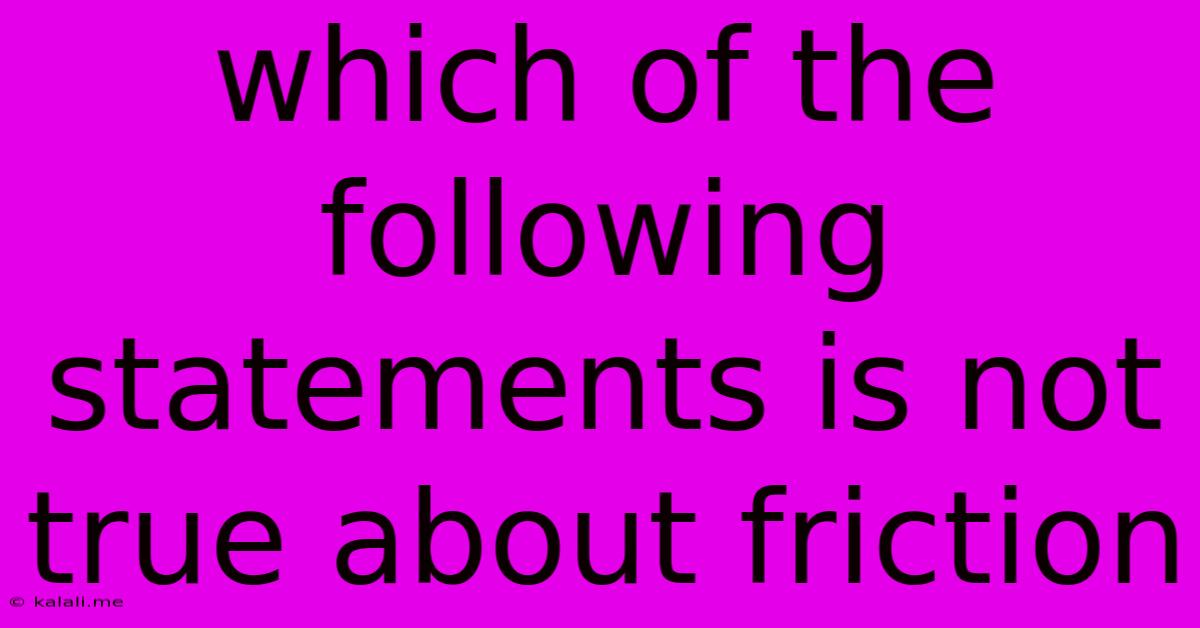Which Of The Following Statements Is Not True About Friction
Kalali
Jun 14, 2025 · 3 min read

Table of Contents
Which of the following statements is not true about friction? Debunking Common Misconceptions
Friction. It's the force that slows down a speeding car, allows you to walk without slipping, and even generates heat when you rub your hands together. Understanding friction is crucial in numerous fields, from engineering to physics. But misconceptions about this fundamental force abound. This article aims to clarify some common misunderstandings and pinpoint the statement that's not true about friction.
What is Friction? Before we delve into false statements, let's establish a clear understanding. Friction is a force that opposes motion between two surfaces in contact. It arises from the microscopic irregularities on the surfaces interacting with each other. The roughness of the surfaces plays a significant role in determining the magnitude of frictional force. This interaction involves interlocking and deformation at the microscopic level.
Now, let's consider some common statements about friction and identify the inaccurate one:
Common Statements About Friction (and their accuracy):
-
Friction always opposes motion. This is true. Friction acts in the opposite direction to the relative motion (or attempted motion) between two surfaces. Whether an object is sliding, rolling, or simply at rest, friction acts to resist movement.
-
Friction depends on the area of contact between surfaces. This is false. While it might seem intuitive that a larger contact area would lead to greater friction, this is generally not the case. The frictional force is primarily dependent on the normal force (the force pressing the surfaces together) and the nature of the surfaces (their materials and roughness). A larger contact area might distribute the pressure, but the total frictional force remains largely unaffected.
-
Friction generates heat. This is true. The microscopic interactions responsible for friction cause energy to be converted into heat. This is why rubbing your hands together warms them up and why brakes on a car get hot when used extensively. This energy conversion is a crucial aspect of understanding friction's behavior.
-
Friction is always undesirable. This is false. While friction can be a hindrance in some situations (like in machinery where it causes wear and tear), it is also essential for many everyday activities. Without friction, we wouldn't be able to walk, drive, or grip objects. It's crucial for the operation of brakes, clutches, and many other mechanical systems. The management and control of friction, rather than its eradication, are often the key to efficient system design.
-
Friction is independent of the velocity of the moving object. This statement is partially true but requires clarification. For low speeds, static and kinetic friction are generally considered independent of velocity. However, at higher velocities, the situation becomes more complex, and the frictional force can be affected by speed, especially with the introduction of factors like air resistance and lubrication.
Conclusion:
The statement that is not true about friction is: Friction depends on the area of contact between surfaces. While intuition might suggest otherwise, the area of contact has a surprisingly minimal effect on the magnitude of frictional force. The normal force and the nature of the surfaces are the primary factors determining the frictional force. Understanding this nuance is crucial for correctly interpreting and applying frictional principles in various contexts. Remember that friction is a complex phenomenon and its behaviour can vary significantly depending on factors like speed, surface materials and lubrication.
Latest Posts
Latest Posts
-
Hexagon Shape Objects In Real Life
Jun 14, 2025
-
What Is The Unit Weight Of Water
Jun 14, 2025
-
Example Of Solid Dissolved In Solid
Jun 14, 2025
-
Air Pressure At Sea Level Is Equal To
Jun 14, 2025
-
What Is The Opposite Of Reluctant
Jun 14, 2025
Related Post
Thank you for visiting our website which covers about Which Of The Following Statements Is Not True About Friction . We hope the information provided has been useful to you. Feel free to contact us if you have any questions or need further assistance. See you next time and don't miss to bookmark.